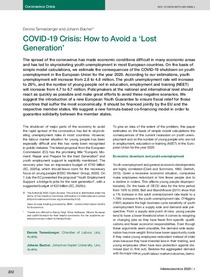COVID-19 crisis: how to avoid a ‘lost generation'

Bacher, Johann ; Tamesberger, Dennis
Intereconomics. Review of European Economic Policy
2020
55
4
July - August
232-238
epidemic disease ; youth unemployment ; youth policy ; economic recession
Young people and child labour
http://dx.doi.org/ 10.1007/s10272-020-0908-y
English
Bibliogr.
"The spread of the coronavirus has made economic conditions difficult in many economic areas and has led to skyrocketing youth unemployment in most European countries. On the basis of simple model calculations, we estimate the consequences of the COVID-19 shutdown on youth unemployment in the European Union for the year 2020. According to our estimations, youth unemployment will increase from 2.8 to 4.8 million. The youth unemployment rate will increase to 26%, and the number of young people not in education, employment and training (NEET) will increase from 4.7 to 6.7 million. Policymakers at the national and international level should react as quickly as possible and make great efforts to avoid these negative scenarios. We suggest the introduction of a new European Youth Guarantee to ensure fiscal relief for those countries that suffer the most economically. It should be financed jointly by the EU and the respective member states. We suggest a new formula-based co-financing model in order to guarantee solidarity between the member states."
Digital
The ETUI is co-funded by the European Union. Views and opinions expressed are however those of the author(s) only and do not necessarily reflect those of the European Union or the ETUI.